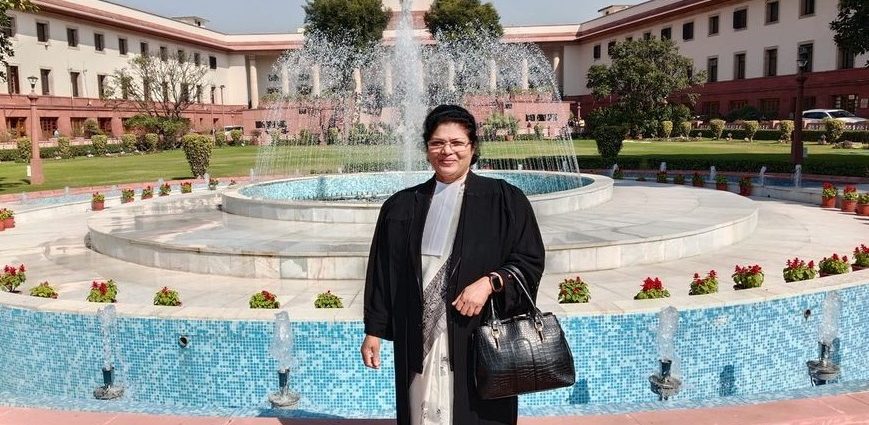By Jose Kavi
New Delhi, May 10, 2024: Catholic priests and religious practicing law in India have reacted differently to a women congregation denying permission to a lawyer member from contesting the Supreme Court Bar Association elections.
Sister Jessy Kurian, a member of the St Ann of Providence and a senior advocate in the apex court, decided to pull out of the race on May 9, the last day to file the nomination.
She told Matters India that she had sought the superior’s permission several days ago, but got a negative response only a day before the nomination. “I had begun the campaign a month earlier,” added the first member of her congregation to study law and who served as a member of the National Commission for Minority Educational Institutions for five years from 2008. She was the first Catholic nun to serve the quasi-judiciary body.
The educator-turned-lawyer said she decided to contest the election since the executive member post is neither political nor lucrative, but a way to enhance her work among the poor and women.
Sister Kurian also said her superiors had not given their reasons for denying her the permission.
Matters India’s attempts to get the views of the superiors proved futile as they apparently ignored the phone calls or email queries.
But to Sister Kurian’s support came the National Lawyers Forum of Religious and Priests (NLFRP) that expressed disappointment over her superiors’ decision.
Forum national convener Jesuit Father Santhanam Arockiasamy, in a statement to Matters India, said Sister Kurian embodies a steadfast commitment to the legal profession and the principles of justice.
“Despite her dedication and qualifications, she has unfortunately been restricted from pursuing an opportunity to serve in the executive committee of the Bar Association, an act which would not only enhance her professional standing but also contribute significantly to the broader legal fraternity,” the statement pointed out.
The Jesuit priest also said that many nuns and priests have law degrees, but only a select few are engaged in regular legal practices.
“Sr. Jessy Kurian stands out as an exemplar in this regard. Her active participation in the Bar Association would not only strengthen her own legal practice but also bring recognition to her congregation and inspire other religious and priest lawyers,” he added.
However, some religious practicing law have different views.
“I feel it’s an unnecessary hype that is being created,” Holy Spirit Sister Julie George, a lawyer in Mumbai, told Matters India.
She is worried that the “unnecessary publicity” to the issue would hamper other priests and nuns practicing law in various parts of India.
Sister Kurian “should have informed her authorities about her intention to contest before starting her campaign” as it involves time, finance and many other aspects, she explained.
Sister George wants people to leave the matter to Sister Kurian and her congregation. “It is their internal matter. Most of us religious lawyers who are mostly doing pro bono work (for public good) are concerned about the poor, women, children, elderly and don’t think of such posts. Our objectives should be clear also our value system within which we operate,” she added.
The Delhi Malayali Lawyers forum says Sister Kurian is “first and foremost a religious/nun” and becoming an association member “is not an integral function of an SC lawyer.”
They also think Sister Kurian’s superiors “have reason while rejecting her proposal” to contest the elections.
Jesuit Father Irudhaya Jothi suspects Sister Kurian has problems with some important people in her congregation. “Hence I would appreciate it if she uses her energy for humanitarian concerns rather than a trivial thing like winning an election,” he added.
Sister Sujata Jena, another lawyer nun practicing in Odisha, says the Church and religious congregations should heed Pope Francis’ call to prioritize working for social justice
“Furthermore, I feel that religious nuns must redesign their vision and mission to focus on working for social justice,” she told Matters India.
The executive members of the Supreme Court Bar Association, she added, have “ample opportunities to ensure human and legal rights, address concerns of poor litigants, and raise their voice against contempt of court. Having a nun on the board could have benefited vulnerable groups such as women, children, and minorities.”
At the same time, the member of Congregation of the Sacred Hearts of Jesus and Mary wants the Catholic religious’ stance “must be clear and in line with the teachings and attitudes of Jesus, our Master.”
Father Santhanam says the forum has impressed upon religious congregations to change their conventional mindsets and recognize and support the diverse vocations of their members, particularly in professions such as law and judiciary.
“Encouraging and facilitating the participation of religious individuals in these fields not only enriches the legal profession but also aligns with the values of justice and service advocated by the teachings of the Church,” he asserted.
The forum also appeals to bishops and major superiors in India to encourage and support their members in pursuing legal studies and engaging in legal practice.
“In the current Indian context, where marginalized communities face myriad challenges and the rights of our institutions require vigilant protection, the presence of dedicated legal professionals is paramount,” he added.











